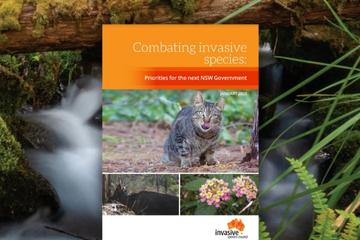The Invasive Species Council expressed concern today about new biosecurity laws being rushed through NSW Parliament this week that will fail to address the state’s growing weed, feral animal and disease threats.
The Biosecurity Bill, which passed through the NSW lower house last week, is set to be put to a vote in the upper house later this week.
“The NSW Government has poorly managed the process, accidently omitting 31 pests and diseases and ignored serious concerns that call for more detail and greater accountability,” said Invasive Species Council CEO Andrew Cox.
“The government has not addressed serious concerns raised earlier in the year by its expert natural resources advisory body and a range of stakeholders.”
The independent NSW Natural Resources Commission warned in June that the proposed bill and accompanying framework ‘appear to be at risk of being a streamlined version of the current arrangements. Without a strong focus on prevention, tenure neutrality, and accountability across the whole biosecurity system the NRC is not confident better outcomes will be achieved for the State or for farmers.[1]’
“Primary Industries Minister, Katrina Hodgkinson, has heralded the major simplification of 14 pieces of legislation into a single law as a ‘responsive regulatory model’. The bill will replace 14 pieces of legislation, some over 90 years old.”
“The Biosecurity Bill doesn’t measure up to best practice biosecurity laws. The Bill gives us little confidence that agricultural and environmental biosecurity will be properly addressed.
The Invasive Species Council has found the Bill has fallen far short in eight key areas (see list of concerns below).
“Good biosecurity laws are critical to the state’s agricultural economy, the environment and our lifestyle. One lapse could see a foot and mouth outbreak that could cost the Australia economy $50 billion or a new pathogen or insect pest that could make another native species extinct.”
“The Baird Government must amend or delay the rushed Biosecurity Bill,” concluded Mr Cox.
MORE INFORMATION
- Submission to proposed framework for a NSW Biosecurity Act – Jun 2014 >>
- Submission to NRC Issues Paper on weed management in NSW – Dec 2013 >>
- NRC review of weed management 2013-14 >>
- NSW biosecurity legislative framework >>
For more information contact Andrew Cox on 0438 588 040
Concerns with NSW Biosecurity Bill
1. Too little detail
The bill replaces 14 existing laws with broad powers and few specific detailed provisions. We are expected to trust that the government will add the details in the regulations.
2. No statutory oversight.
There is no assurance about the integrity and the success of biosecurity arrangements. The Natural Resources Commission (NRC) proposed an independent statewide oversight committee as essential to ensuring accountability and auditing performance.
3. No mandatory reporting
There needs to be regular reporting of biosecurity incidents, risk assessments and a ‘State of Biosecurity’ report to build public confidence in the system and allow scrutiny of decisions and performance.
4. No permitted list approach
This is the most preventative and cost effective approach to reducing the chance of new invasive species establishment. The highest priority target must be aquatic plants and nursery garden plants as proposed by the NRC.
5. No role for the Minister for the Environment or OEH
Without formal roles, the environment gets relegated as a low priority or ignored. The Minister for Primary Industries has a clear conflict of interest that favours agricultural priorities.
6. Need for expert panel
A statutory body of experts is needed to ensure the rigour of science used in risk assessments and other risk-mitigation measures.
7. Missing principles
There is no requirement to prevent new biosecurity risks or to prioritise prevention. The legislation is just a ‘framework’ rather than a purposeful regime. The precautionary principle is not mandated. Instead government will only act if there is indisputable evidence or very high risk, an irresponsible way to manage risk.
8. Third party appeal rights
The legislation specifically prevents third party appeals. There must be the ability for the public acting in the public interest to enforce the act and challenge unscientific decisions.









